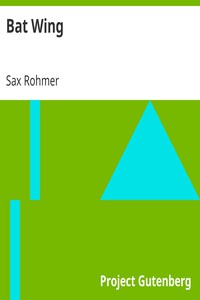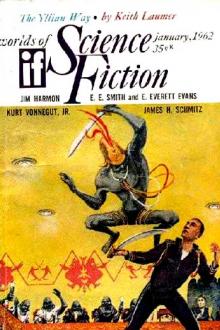Bat Wing by Sax Rohmer (bts books to read .TXT) 📗

- Author: Sax Rohmer
Book online «Bat Wing by Sax Rohmer (bts books to read .TXT) 📗». Author Sax Rohmer
“Is Mr. Camber at home?” I enquired.
“Master no got,” crooned Ah Tsong.
He proceeded quietly to close the door again.
“One moment,” I said, “one moment. I wish, at any rate, to leave my card.”
Ah Tsong allowed the door to remain open, but:
“No usee palaber so fashion,” he said. “No feller comee here. Sabby?”
“I savvy, right enough,” said I, “but all the same you have got to take my card in to Mr. Camber.”
I handed him a card as I spoke, and suddenly addressing him in “pidgin,” of which, fortunately, I had a smattering:
“Belong very quick, Ah Tsong,” I said, sharply, “or plenty big trouble, savvy?”
“Sabby, sabby,” he muttered, nodding his head; and leaving me standing in the porch he retired along the sparsely carpeted hall.
This hall was very gloomily lighted, but I could see several pieces of massive old furniture and a number of bookcases, all looking incredibly untidy.
Rather less than a minute elapsed, I suppose, when from some place at the farther end of the hallway Mr. Camber appeared in person. He wore a threadbare dressing gown, the silken collar and cuffs of which were very badly frayed. His hair was dishevelled and palpably he had not shaved this morning.
He was smoking a corncob pipe, and he slowly approached, glancing from the card which he held in his hand in my direction, and then back again at the card, with a curious sort of hesitancy. In spite of his untidy appearance I could not fail to mark the dignity of his bearing, and the almost arrogant angle at which he held his head.
“Mr—er—Malcolm Knox?” he began, fixing his large eyes upon me with a look in which I could detect no sign of recognition. “I am advised that you desire to see me?”
“That is so, Mr. Camber,” I replied, cheerily. “I fear I have interrupted your work, but as no other opportunity may occur of renewing an acquaintance which for my part I found extremely pleasant—”
“Of renewing an acquaintance, you say, Mr. Knox?”
“Yes.”
“Quite.” He looked me up and down critically. “To be sure, we have met before, I understand?”
“We met yesterday, Mr. Camber, you may recall. Having chanced to come across a contribution of yours of the Occult Review, I have availed myself of your invitation to drop in for a chat.”
His expression changed immediately and the sombre eyes lighted up.
“Ah, of course,” he cried, “you are a student of the transcendental. Forgive my seeming rudeness, Mr. Knox, but indeed my memory is of the poorest. Pray come in, sir; your visit is very welcome.”
He held the door wide open, and inclined his head in a gesture of curious old-world courtesy which was strange in so young a man. And congratulating myself upon the happy thought which had enabled me to win such instant favour, I presently found myself in a study which I despair of describing.
In some respects it resembled the lumber room of an antiquary, whilst in many particulars it corresponded to the interior of one of those second-hand bookshops which abound in the neighbourhood of Charing Cross Road. The shelves with which it was lined literally bulged with books, and there were books on the floor, books on the mantelpiece, and books, some open and some shut, some handsomely bound, and some having the covers torn off, upon every table and nearly every chair in the place.
Volume seven of Burton’s monumental “Thousand Nights and a Night” lay upon a littered desk before which I presumed Mr. Camber had been seated at the time of my arrival. Some wet vessel, probably a cup of tea or coffee, had at some time been set down upon the page at which this volume was open, for it was marked with a dark brown ring. A volume of Fraser’s “Golden Bough” had been used as an ash tray, apparently, since the binding was burned in several places where cigarettes had been laid upon it.
In this interesting, indeed unique apartment, East met West, unabashed by Kipling’s dictum. Roman tear-vases and Egyptian tomb-offerings stood upon the same shelf as empty Bass bottles; and a hideous wooden idol from the South Sea Islands leered on eternally, unmoved by the presence upon his distorted head of a soft felt hat made, I believe, in Philadelphia.
Strange implements from early British barrows found themselves in the company of Thugee daggers There were carved mammals’ tusks and snake emblems from Yucatan; against a Chinese ivory model of the Temple of Ten Thousand Buddhas rested a Coptic crucifix made from a twig of the Holy Rose Tree. Across an ancient Spanish coffer was thrown a Persian rug into which had been woven the monogram of Shah-Jehan and a text from the Koran. It was easy to see that Mr. Colin Camber’s studies must have imposed a severe strain upon his purse.
“Sit down, Mr. Knox, sit down,” he said, sweeping a vellum-bound volume of Eliphas Levi from a chair, and pushing the chair forward. “The visit of a fellow-student is a rare pleasure for me. And you find me, sir,” he seated himself in a curious, carved chair which stood before the desk, “you find me engaged upon enquiries, the result of which will constitute chapter forty-two of my present book. Pray glance at the contents of this little box.”
He placed in my hands a small box of dark wood, evidently of great age. It contained what looked like a number of shrivelled beans.
Having glanced at it curiously I returned it to him, shaking my head blankly.
“You are puzzled?” he said, with a kind of boyish triumph, which lighted up his face, which rejuvenated him and gave me a glimpse of another man. “These, sir,” he touched the shrivelled objects with a long, delicate forefinger “are seeds of the sacred lotus of Ancient Egypt. They were found in the tomb of a priest.”
“And in what way do they bear upon the enquiry to which you referred, Mr. Camber?”
“In this way,” he replied, drawing toward him a piece of newspaper upon which rested a mound of coarse shag. “I maintain that the vital principle survives within them. Now, I propose to cultivate these seeds, Mr. Knox. Do you grasp the significance, of this experiment?”
He knocked out the corn-cob upon the heel of his slipper and began to refill the hot bowl with shag from the newspaper at his elbow.
“From a physical point of view, yes,” I replied, slowly. “But I should not have supposed such an experiment to come within the scope of your own particular activities, Mr. Camber.”
“Ah,” he returned, triumphantly, at the same time stuffing tobacco into the bowl of the corn-cob, “it is for this very reason that





Comments (0)